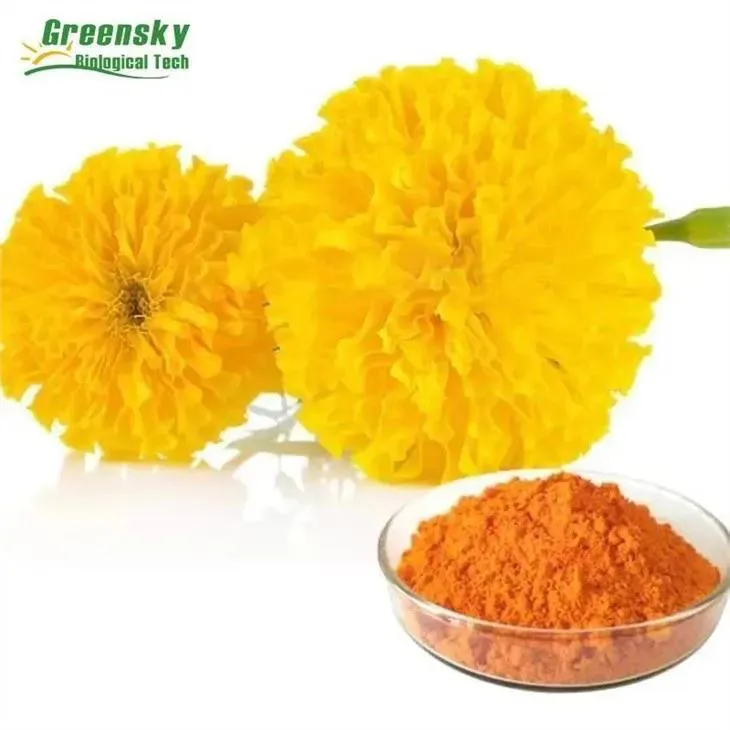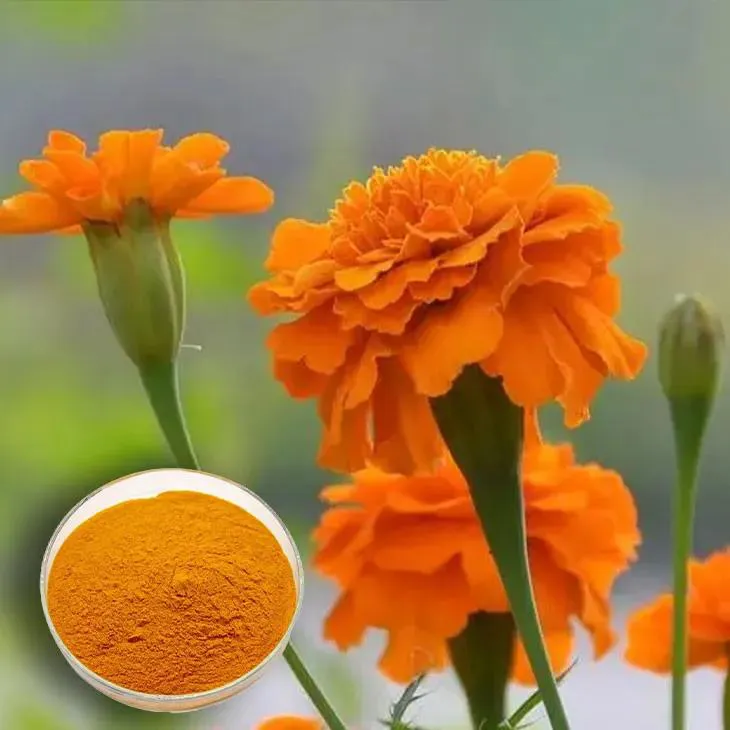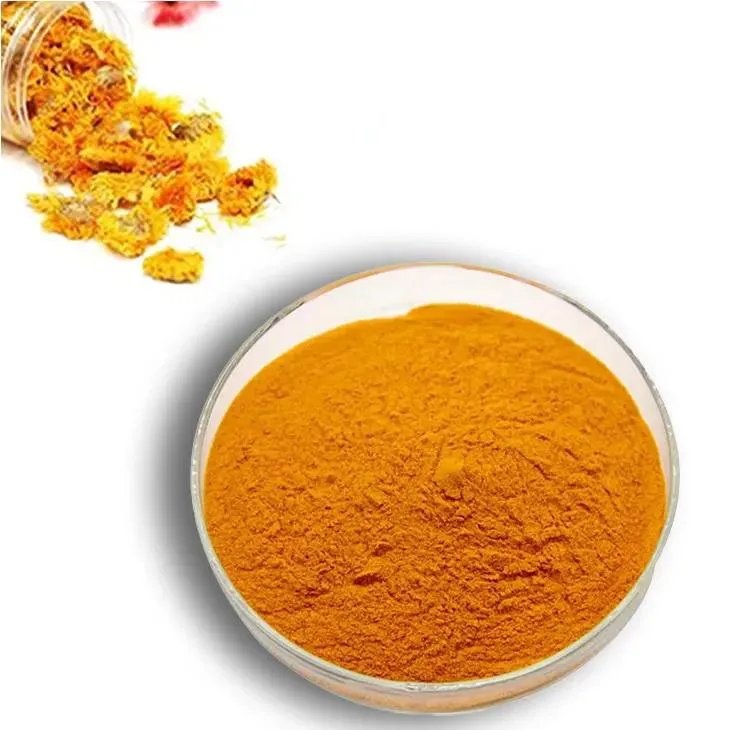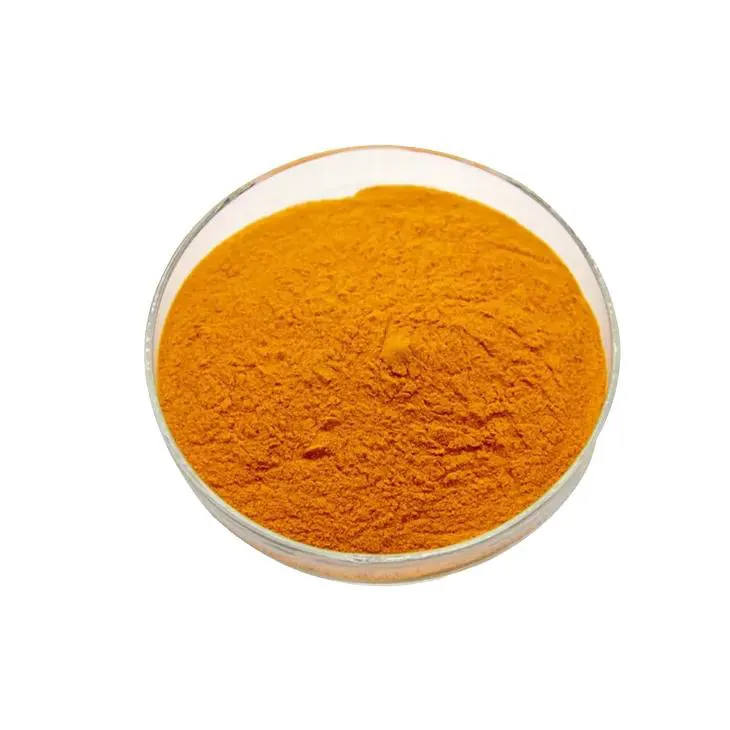- 0086-571-85302990
- sales@greenskybio.com
Factory - wholesale plant extracts, organic marigold extracts.
2024-12-11

1. Introduction to the Factory - Wholesale Model
The factory - wholesale model of organic Marigold Extract has emerged as a significant trend in recent years. This model combines the efficiency of large - scale production in factories with the cost - effectiveness of wholesale distribution. Factories are equipped with advanced extraction technologies and strict quality control systems to ensure the production of high - quality organic Marigold Extract.
The wholesale aspect plays a crucial role in making this valuable extract accessible to a wide range of industries. By purchasing in bulk, wholesalers can obtain the extract at a lower cost per unit, which in turn allows them to offer competitive prices to their customers. This model has contributed to the growing popularity of organic Marigold Extract in various sectors.

2. The Source: Marigold Plants
Marigold plants are the source of this remarkable extract. These plants are carefully selected for extraction in factories. Organic marigold plants are grown without the use of synthetic pesticides or fertilizers, ensuring the purity and naturalness of the extract.
There are different species of marigolds, but the ones used for extraction are typically chosen for their high content of beneficial compounds. The plants are cultivated in suitable environments, which may vary depending on the species. For example, some marigolds thrive in sunny and well - drained soil conditions.

3. Composition and Benefits in Skincare
3.1 Composition
Organic marigold extract is rich in a variety of beneficial components. It contains flavonoids, which are known for their antioxidant properties. These flavonoids help in protecting the skin from free radical damage. Additionally, it contains carotenoids, such as lutein and zeaxanthin, which contribute to the extract's skin - friendly characteristics.
3.2 Skincare Benefits
In the realm of skincare, organic marigold extract is a highly prized ingredient. It has several notable benefits:
- Skin Soothing: It can effectively soothe irritated skin. Whether the irritation is caused by external factors such as environmental pollutants or internal factors like skin sensitivity, marigold extract can provide relief.
- Anti - Inflammation: The extract has anti - inflammatory properties. It can reduce redness and swelling associated with skin inflammation, making it suitable for treating various skin conditions such as acne and eczema.
- Healthy Complexion: By promoting skin cell regeneration and improving blood circulation, it helps in achieving a healthy and glowing complexion.
- Anti - Aging: The antioxidant power of the extract helps in combating the signs of aging. It can reduce the appearance of wrinkles and fine lines, maintaining the skin's youthful appearance.

4. Potential in the Pharmaceutical Field
In the pharmaceutical field, organic marigold extract shows great potential. Studies have indicated that certain elements within the extract may possess anti - inflammatory and antibacterial properties.
Anti - Inflammatory Properties: The anti - inflammatory effects of marigold extract could be further explored for the development of drugs to treat inflammatory diseases. For example, it may potentially be used in the treatment of arthritis or other chronic inflammatory conditions.
Antibacterial Properties: The antibacterial nature of the extract might be harnessed for the development of new antibiotics or antibacterial agents. This could be especially valuable in the face of the growing problem of antibiotic - resistant bacteria.
However, more research is needed to fully understand and utilize these properties. Rigorous clinical trials and in - depth pharmacological studies are required to determine the safety and efficacy of marigold - based pharmaceutical products.

5. Role in the Agricultural Sector
5.1 Natural Pesticides
In the agricultural sector, organic marigold extract - based products may have the potential to be used as natural pesticides. Some research suggests that certain compounds in the extract can repel or inhibit the growth of pests. This provides an alternative to synthetic pesticides, which may have negative impacts on the environment and human health.
5.2 Growth Enhancers
There is also evidence to suggest that marigold extract can act as a growth enhancer for plants. It may influence plant growth by improving nutrient uptake or by enhancing the plant's natural defense mechanisms. This could lead to increased crop yields and healthier plants.
However, the application of marigold extract in agriculture is still in the experimental stage in many cases. Further research is needed to optimize its use, determine appropriate dosages, and assess its long - term effects on soil quality and the ecosystem.
6. Quality Control in the Factory - Wholesale Process
Quality control is of utmost importance in the factory - wholesale process of organic marigold extract. Factories need to implement strict quality control measures at every stage of production.
- Raw Material Selection: The selection of marigold plants is the first step in quality control. Only healthy, organically grown plants should be used for extraction.
- Extraction Process: The extraction process should be carefully monitored to ensure that the beneficial components are effectively extracted while minimizing the loss of active ingredients. Advanced extraction techniques, such as supercritical fluid extraction, may be employed to achieve high - quality extracts.
- Testing and Analysis: After extraction, the marigold extract should undergo comprehensive testing and analysis. This includes tests for purity, potency, and the presence of contaminants. Only extracts that meet strict quality standards should be released for wholesale.
- Storage and Transportation: During storage and transportation, proper conditions should be maintained to preserve the quality of the extract. This may involve controlling temperature, humidity, and light exposure.
7. Market Trends and Future Prospects
The market for organic marigold extract has been growing steadily, driven by the increasing demand for natural and organic products in various industries.
Skincare Industry: In the skincare industry, consumers are increasingly seeking products with natural ingredients. The popularity of marigold - based skincare products is expected to continue to rise, especially among those with sensitive skin or those who prefer natural alternatives to synthetic ingredients.
Pharmaceutical Industry: With the growing interest in natural remedies and the need for new drugs to combat various diseases, the pharmaceutical industry may invest more in research on marigold extract in the future.
Agricultural Industry: As the demand for sustainable and environmentally - friendly agricultural practices increases, the potential use of marigold extract as a natural pesticide or growth enhancer may gain more attention.
However, challenges also exist. These include the need for more research to fully understand the properties of marigold extract, regulatory compliance in different industries, and competition from other natural and synthetic products.
8. Conclusion
The factory - wholesale model of organic marigold extract offers great potential in multiple industries. From skincare to pharmaceuticals and agriculture, the extract's diverse properties make it a valuable ingredient. However, continuous research, strict quality control, and market - driven innovation are essential to fully realize its potential and ensure its sustainable development in the future.
FAQ:
What are the main beneficial components in organic marigold extract?
Organic marigold extract is rich in various beneficial components. Some of the key ones include flavonoids and carotenoids. Flavonoids contribute to its antioxidant properties, helping to combat free radicals in the body. Carotenoids, such as lutein and zeaxanthin, are known for their positive effects on skin health and potential anti - inflammatory properties.
How is the organic marigold extract produced in the factory?
The production process in the factory typically involves several steps. First, high - quality marigold plants are carefully selected. Then, they are usually dried and ground into a fine powder. After that, solvents are used to extract the active components from the powdered marigold. The resulting extract is then purified and concentrated to obtain the final organic marigold extract product.
Can organic marigold extract be used in combination with other skincare ingredients?
Yes, it can. Organic marigold extract is often combined with other skincare ingredients. For example, it can be paired with hyaluronic acid to enhance skin hydration while also providing its anti - inflammatory and antioxidant benefits. It can also be combined with vitamins such as vitamin C and E to create more comprehensive skincare formulations.
What are the potential side effects of using organic marigold extract?
When used as directed, organic marigold extract generally has few side effects. However, in some rare cases, individuals may experience mild skin irritation, especially those with extremely sensitive skin. It is always recommended to do a patch test before using products containing marigold extract. Also, if taken internally for potential pharmaceutical uses, it should be done under medical supervision to ensure proper dosage and to avoid any potential adverse reactions.
How does the wholesale model of organic marigold extract benefit the agricultural industry?
The wholesale model benefits the agricultural industry in multiple ways. For one, it makes the marigold extract - based products, such as potential natural pesticides or growth enhancers, more affordable for farmers. This allows them to access these products on a larger scale, which can potentially improve crop yields and quality. Additionally, the wholesale model can help in the distribution of research - based products more efficiently, enabling faster adoption of new agricultural techniques using marigold extract.
Related literature
- The Composition and Benefits of Organic Marigold Extract in Skincare"
- "Marigold Extract: A Potential Source for Pharmaceutical Development"
- "The Role of Marigold Extract in Agriculture: A Comprehensive Review"
- ▶ Hesperidin
- ▶ Citrus Bioflavonoids
- ▶ Plant Extract
- ▶ lycopene
- ▶ Diosmin
- ▶ Grape seed extract
- ▶ Sea buckthorn Juice Powder
- ▶ Fruit Juice Powder
- ▶ Hops Extract
- ▶ Artichoke Extract
- ▶ Mushroom extract
- ▶ Astaxanthin
- ▶ Green Tea Extract
- ▶ Curcumin
- ▶ Horse Chestnut Extract
- ▶ Other Product
- ▶ Boswellia Serrata Extract
- ▶ Resveratrol
- ▶ Marigold Extract
- ▶ Grape Leaf Extract
- ▶ New Product
- ▶ Aminolevulinic acid
- ▶ Cranberry Extract
- ▶ Red Yeast Rice
- ▶ Red Wine Extract
-
Fenugreek Extract Powder
2024-12-11
-
Lavender Extract
2024-12-11
-
Maitake Mushroom Extract
2024-12-11
-
Bilberry Extract
2024-12-11
-
Hops Extract
2024-12-11
-
Artichoke Leaf Extract
2024-12-11
-
Purple Sweet Potato Extract
2024-12-11
-
Sophora Flavescens Root Extract
2024-12-11
-
Agaricus Blazei Extract
2024-12-11
-
Kelp Extract Powder
2024-12-11





















